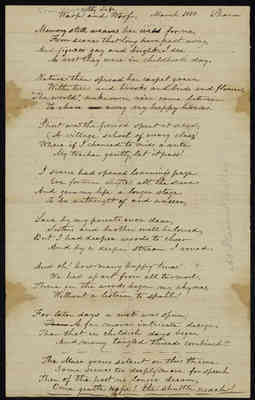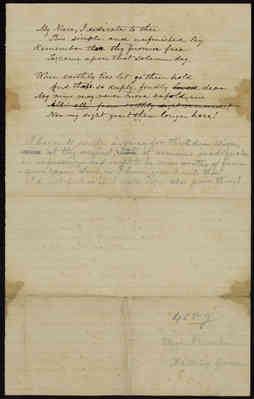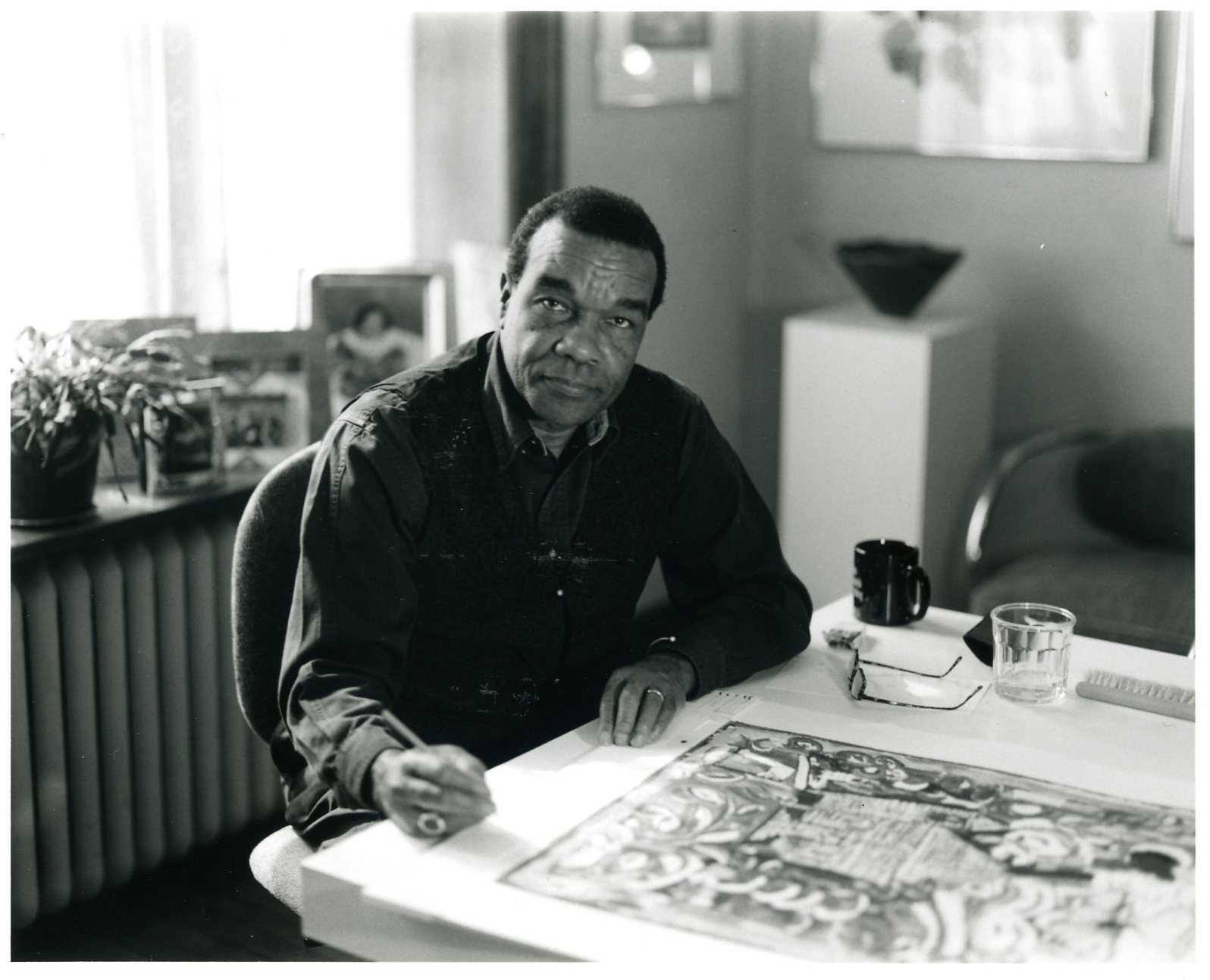Pages
histmss-074989-0001
D-18 THE SUNDAY STAR, Washington, D. C. SUNDAY, JANUARY 11, 1953
Old Diaries Picture Era Dating 1845 to 1913 By Jessie Fant Evans
Mrs. Charles Thomas Watson of this city is the possessor of the diaries of her grandmother, Elizabeth Steel Wright, from her wedding day in May, 1845, when she was 21, until her death in 1913 at the age of 88. "This span of 67 years, covered in 17 volumes, constitutes one of the longest, continuous examples of diary-keeping in existence," Mrs. Watson believes.
This feminine Pepys, who shares his gift "for recording small events and large in a lively and interesting manner," married John E. Wright, a wellknown science teacher and lecturer of his day. As a bride and later as the mother of their three children, she accompanied him on his far-flung journeys, north, east, south and west, meeting unbelievably primitive living conditions with a matterof-fact philosophy. For instance, there is this early entry made in Illinois in 1847, "We sleptup aloft in a one-room loghouse and any one can sleep as well aloft as anywhere if they think so."
A cousin of Noah Webster through her grandfather, Josiah Steele, Connecticut Revolutionary patriot, Elizabeth Steele Wright's diary entries do credit to her famous kinsman, who compiled the first "Webster's Dictionary" and "Spelling Book." Invariably they are set down in clear, concise phraseology, with only very rarely a mispelled word.
Born during the early days of John Quincy Adams' administration she lived to witness the inaugration of President Wilson.
Her saga of the itenerary upon which she accompanied her husband is an Americana of the development of our Nation from tinder box, flint and steel to the approach of the Civil War, when he was accidentally killed in a hunting accident. It also constitutes a veritable travelers' directory of the roads they traversed, and the streams they forded or were ferried across.
An entry of April 3, 1850, concerns their first trip to the Nation's Capital, Gen. Zachary Taylor was in the White House, successful candidate of the Whigs in the last election this party was to win. She writes: "Stopped overnight at Occoquan, which will never be large, it is too near Alexandria. From Alexandria had a pike the remaining 8 miles. Crossed the Potomac on a mile-long but rather indifferent bridge. However, it serves the purpose. Found to our regret John C. Calhoun had been buried at noon. We should have liked to honor his memory by attending his funeral. Walked to the Capitol Building and found it inspiring with its beautifully laid-out grounds, planting chiefly evergreens, white pine and arbor vitae. Its two fountains were not playing. Liked particularly the pictures in the interior of George Washington and the Embarkation of the Pilgrims."
Of their visit to the President's House (the White House) she says: "It is much better looking than we expected from the descriptions of it. We happened to meet "Old Zack" (President Taylor) standing before his door. He urged us to come in but we declined and continued our stroll through the grounds." This casual time in the little town of Washington on the banks of the Potomac was at a time when resolutions requesting the admission of California as a State and the organization of New Mexico and Utah as Territories were before the Congress of the United States.
Another visit to this city during Senator Blaine's time (the red brick residence which he occupied is standing fronting Massachusetts avenue above Dupont Circle) brings forth this comment: "His daughter has just been married to some German
musician"—no less than Walter Damrosch!
Concerning her first visit to her husband's relatives on May 28, 1948, near Livingston, N. J., the bride writes: "After a capital dinner, there was also a good dish of Christian conversation. Later we all took tea, then the old ladies snuffed and talked, the old men smoked and talked and the younger portion of the company played and sang and danced until 12 o'clock."
Spring Hill, Tenn., gets this notation: "James K. Polk's residence is a plain frame building. Horseback is the favorite method of transportation. Many ladies have never had their feet in a carriage and never expect to, for the few who have tried it say the swaying motion makes them ill."
A South Carolina entry says: "We have seen South Carolina ladies go partridge hunting with nets on horseback with their husbands. It affords them a great deal of sport."
Of Audubon's passenger pigeons, now practically extinct, there is this comment: "They are so numerous they break the trees down. Natives do not bother to shoot them, but rather flail them off by the wagonload. The sky was so filled with them they obscured the sun."
She makes this matter-of-fact jotting as to lawyers and the hazards of the road: It is court time in Springfield, Ill., and lawyers are as thick as spatter. The rain is pouring in every direction but we got through the day by laughing at our calamities. On the way here, the horses got so deep in mud we often throught we would have to turn back but perseverance accomplishes wonders. The worst time was when the wolves chased my husband when he got out to better see the way. I am sorry we did not recover the Bible and the other books we lost when I stood up on the buggy seat to keep the water from the last ford coming up over my knees. We should not neglect our minds any more than our bodies because by cultivating our minds we learn how to appreciate and enjoy life."
Elizabeth Steele Wright's spirit and enterprise and that of her husband in an era when telegraphy was new, the wonders of electricity still little realized and the railroad an innovation along with similar courage and initiative on the part of thousands of other Americans were part of the alchemy that helped make our Nation great. Its survival in us, their descendants, will keep it so.
histmss-074989-0002
My Life Warp and Woof. March 1880. Sharon
Memory still weaves her webs for me, From scenes that long have past away, And figured gay and bright I see As erst they were in the childhood's day.
Natures then spread her carpet green With trees and brooks and birds and flowers, "The world," unknown ne'er came between To chase away my happy hours.
Short was the period spent at school, (A village school of every class) Where if I chanced to miss a rule My teacher gently, let it pass!
I scarce had opened learning's page Ere fortune shifted all the scene And gave my life a longer stage To be unthought of and unseen,
Love by my parents ever dear, Sisters and brother well beloved, But I had deeper woods to cheer And by a deeper stream I roved.
And oh! how many happy times! We had apart from all turmoil, There in the woods began my rhymes, Without a listener to spoil!
For later days a web was spun; [crossed out: Than] A far more intricate design, Than that in childish days begun And many tangled threads combined!!
The Muse grows silent on this theme Some scenes too deeply move for speech Then of the past no longer dream, Come gentle Hope! the shuttle reach! [lst line underscored]
histmss-074989-0003
My Niece, I dedicate to thee This simple and unfinished lay; Remember then thy promise free To come upon that solemn day,
When earthly ties let go their hold And those so deeply, fondly [loved deleted] dear My arms may never more enfold [crossed out: All! all! from earthly sight removed!] Now my sight greet them longer here!
I began to write a verse for thee dear Eliza, [crossed out: and] at thy request, [crossed out: and] but it remains inadequate in expression and ought to be more worthy of four score years. "Such as I have, give I unto thee" I do not feel as if I could copy the poor thing!
465-g Eliza Brooke Falling Green




